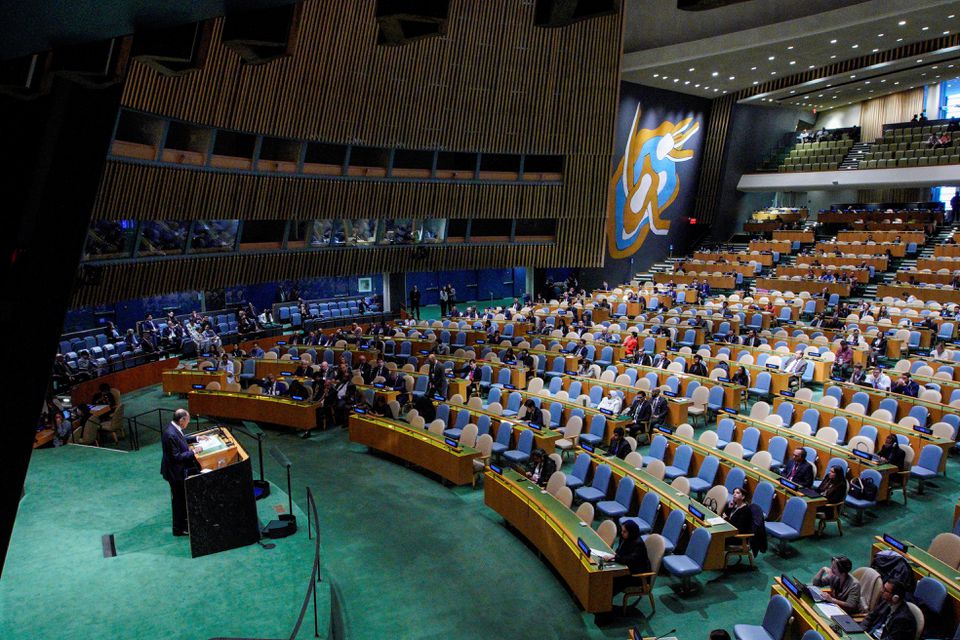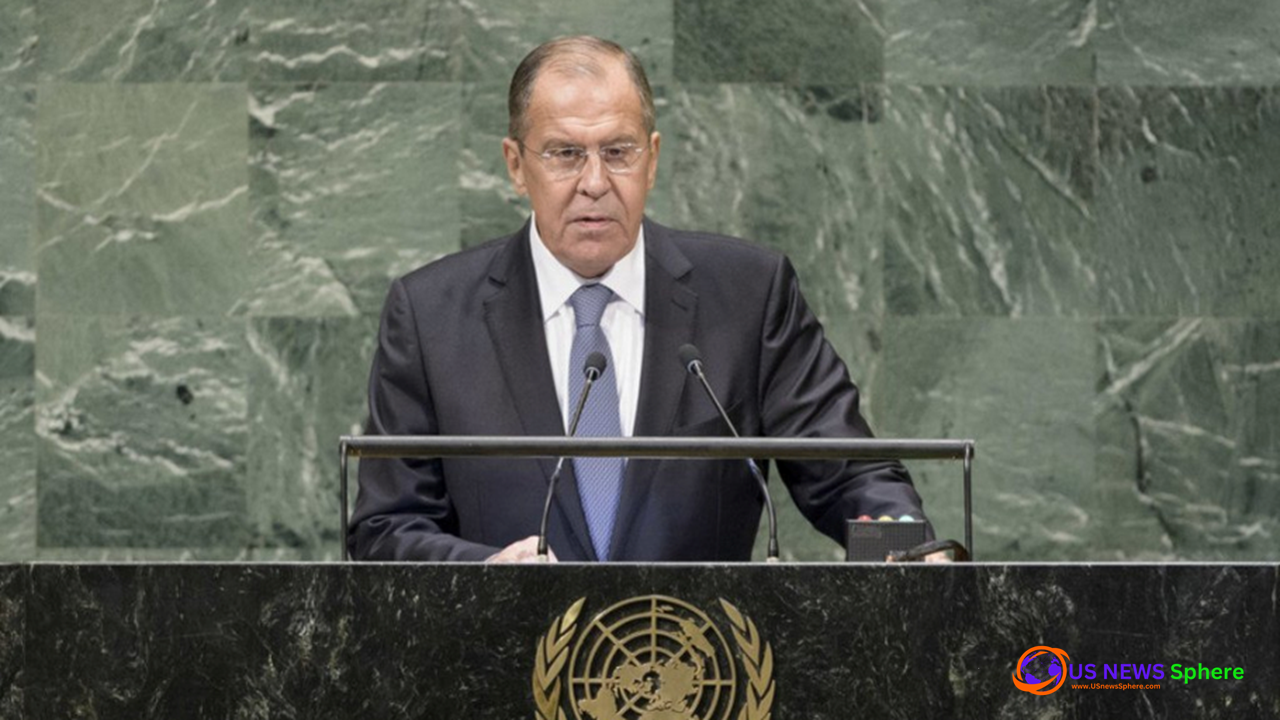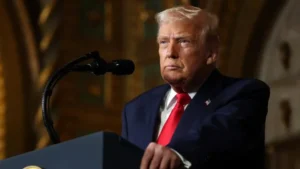The United States has called on Russia and Ukraine to set out to revive Black Sea cooperation as the two countries’ relations remain tense.
In his address to the United Nations General Assembly on Wednesday, Russia’s Foreign Minister Sergei Lavrov said that the Black Sea region is of “particular importance” to his country.
Lavrov also said that Russia is ready to work with its partners in the region to promote “stability, security and prosperity.”

Russia’s Foreign Minister Sergei Lavrov addresses the 78th session of the UN General Assembly in New York City.
Table of Contents
The statement comes as tensions between Russia and Ukraine continue to simmer. In recent months, Russia has been accused of building up its military presence in the Black Sea region and violating Ukrainian airspace.
Kiev has also accused Moscow of backing separatist rebels in eastern Ukraine. The conflict in eastern Ukraine has killed more than 10,000 people since it began in 2014.
In his address, Lavrov called on all parties to the conflict to “fully implement” the Minsk peace agreements, which were brokered by Russia, France, Germany and Ukraine in 2015.
The Minsk agreements call for a ceasefire in eastern Ukraine, as well as a withdrawal of heavy weapons and a constitutional reform that would give more autonomy to the separatist-held regions.
However, implementation of the agreement has been slow and both sides have accused each other of violating the ceasefire.
The United States has been critical of Russia’s actions in the Black Sea region and has accused Moscow of violating the INF Treaty, a 1987 arms control agreement that bans land-based missiles with a range of 500-5,500 kilometers.
In February, the United States pulled out of the treaty, citing Russian violations. Moscow has denied any wrongdoing and has accused the United States of violating the treaty.
Washington has also announced plans to deploy additional troops and equipment to Eastern Europe, closer to Russia’s borders.
The move has been criticized by Moscow as a breach of trust and an attempt to destabilize the region.
Some progress in Syria despite Kremlin attacks: Russian FM
Syria has made some progress in its ongoing conflict, despite Kremlin attacks, Russian Foreign Minister Sergei Lavrov said in a speech at the 78th session of the United Nations General Assembly.
“The Syrian Arab Republic has managed to liberate almost all of its territory from terrorists,” Lavrov said. “The Syrian people are gradually regaining control of their country.”
However, Lavrov also acknowledged that the conflict is far from over, and that Syria faces many challenges.
“The Syrian people still have to deal with the consequences of the foreign intervention, including the presence of illegal armed groups and terrorists, as well as millions of refugees and internally displaced persons,” he said.
Lavrov also had harsh words for the United States, accusing it of interfering in Syria’s internal affairs.
“The United States has been grossly violating the sovereignty of Syria,” he said. “It is time for the United States to stop using the pretext of combating terrorism to pursue its own geopolitical goals.”
Despite the challenges, Lavrov said he is hopeful that Syria can overcome them and emerge as a strong and united country.
“We are convinced that the Syrian people, with the support of their friends, will be able to consolidate the achievements of the past years, rebuild their country and ensure a better future for their children,” he said.
Sergei Lavrov Russia is not alone on gas pipeline project: FM
Russia’s Foreign Minister Sergei Lavrov addresses the 78th session of the U.N. General Assembly in New York City [USnewsSphere.com][npr]
U.S. Secretary of State Rex Tillerson (R) and Russian Foreign Minister Sergei Lavrov shake hands during a meeting on the sidelines of the United Nations General Assembly in New York, U.S., September 20, 2017.
Secretary of State Rex Tillerson and Russian Foreign Minister Sergei Lavrov tried on Tuesday to paper over deep divisions between their countries, stressing areas of cooperation even as they acknowledged sharp disagreements on Syria and Ukraine.
In his first public comments since President Donald Trump and Lavrov met privately on Monday, Tillerson told reporters at the United Nations that the two countries had a “productive conversation” and that Trump “pressed” for Kremlin help in addressing several urgent U.S. foreign policy goals.
These included North Korea’s nuclear program, the unresolved conflict in Ukraine and what the United States sees as Russia’s meddling in the 2016 presidential election.
“With respect to North Korea, we had a very lengthy discussion of the Korean Peninsula and both of us committed to do everything we can to bring levels of tensions down in the Peninsula,” Tillerson told reporters.
“The current situation is unacceptable, the continued launching of ballistic missiles is unacceptable and Russia has a unique position in being able to help resolve that crisis for us.”
Lavrov, speaking at the same news conference, said Trump had made “specific proposals” on North Korea, which he declined to identify, and that Moscow was ready to consider them.
Lavrov also said Russia was not alone on a gas pipeline project: FM
“There are other participants in this project … And we are proceeding from the fact that the interests of all participants must be taken into account,” he said.
The United States has been critical of the $11-billion Nord Stream 2 pipeline that will ship Russian gas to Germany under the Baltic Sea, saying it will increase Europe’s dependence on Moscow. Russia has said the project is a commercial venture.
Lavrov also said discussions with Tillerson had touched on the Syrian conflict and the need to find a political solution to a war that has killed hundreds of thousands and made more than 11 million people homeless.
Regional solutions to transit trade: German FM
In an article published by Deutsche Welle on January 16, 2019, German Foreign Minister Heiko Maas called for regional solutions to the transit trade dispute between Russia and Ukraine. This dispute has been ongoing since Russia’s annexation of Crimea in 2014 and the resulting economic sanctions placed on Russia by the EU.
Maas’ comments come as the UN is seeking to broker a deal between the two countries that would allow for the resumed flow of trade through the Black Sea. However, Russia’s Foreign Minister Sergei Lavrov has called the UN’s efforts “unrealistic.”

Two Ships Headed To Ukraine’s Black Sea Ports
The transit trade dispute is just one example of the many challenges faced by Ukraine since Russia’s annexation of Crimea. The EU has been a strong supporter of Ukraine during this time, providing economic and political assistance.
Maas’ call for regional solutions to the transit trade dispute is a recognition of the fact that Ukraine cannot resolve this issue on its own. The EU must work with Russia and other regional partners to find a way to allow trade to resume through the Black Sea.
The transit trade dispute is just one example of the many challenges faced by Ukraine since Russia’s annexation of Crimea. The EU has been a strong supporter of Ukraine during this time, providing economic and political assistance.
Maas’ call for regional solutions to the transit trade dispute is a recognition of the fact that Ukraine cannot resolve this issue on its own. The EU must work with Russia and other regional partners to find a way to allow trade to resume through the Black Sea.
Lavrov: UN initiative ‘unrealistic’
Russia’s Lavrov calls UN bid to revive Black Sea deal unrealistic
The United Nations’ initiative to revive a Black Sea fleet deal between Russia and Ukraine is “unrealistic”, Russian Foreign Minister Sergei Lavrov has said.
The UN Security Council is due to discuss the proposal on Friday, amid tensions between Russia and Ukraine over Moscow’s annexation of Crimea.
Under the original 1997 agreement, the Russian navy was allowed to keep its fleet in Ukraine’s Crimea peninsula until 2042.
But following Russia’s annexation of Crimea in 2014, Ukraine withdrew from the deal.
The UN proposal, put forward by France and Germany, would see a new base established in Crimea for the Russian navy, with Ukraine and Russia sharing access.
“From the very beginning, we said that this is an unrealisable project,” Mr Lavrov told reporters on Thursday.
“Our French and German colleagues persistently circulate this project in the UN Security Council. But I think that it is high time to stop doing this.”
Meanwhile, Ukrainian Foreign Minister Pavlo Klimkin said his country would “never agree” to the return of the Russian navy to Crimea.
He accused Russia of “openly violating” the UN Charter by stationing its navy in Crimea, and said the UN initiative would only serve to legitimise Russia’s “illegal occupation” of the peninsula.
UN tries to revive Black Sea pact
The United Nations Security Council is trying to revive a long-dormant pact to demilitarize the Black Sea, but Russia’s Foreign Minister Sergei Lavrov has already called the move “unrealistic.”
The Black Sea region has been a powder keg for centuries, and the UN’s efforts to keep the peace there have been largely unsuccessful. The most recent attempt was the 2014 Budapest Memorandum, which called for all countries with a coastline on the Black Sea to demilitarize the area.
However, the Memorandum has been all but ignored in the years since it was signed, and the situation in the Black Sea has only deteriorated. With Russia’s annexation of Crimea and its continued aggression in Ukraine, the UN is now trying to resurrect the Memorandum in the hopes of averting a full-scale war in the region.
Lavrov, for his part, doesn’t seem to think much of the UN’s chances. “I don’t know what our Western partners are thinking, but it is absolutely unrealistic to try to implement the Budapest Memorandum now,” he said.
It’s hard to see how the UN could possibly enforce the terms of the Memorandum, even if all the countries involved were on board. And with Russia already showing blatant disregard for international law, it seems even less likely that they would suddenly start abiding by the terms of a long-forgotten agreement.
The situation in the Black Sea is dangerous and volatile, and it seems unlikely that the UN will be able to do anything to stop a full-scale war from breaking out.





